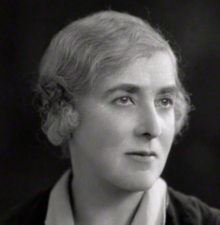Helen Archdale
Helen Archdale | |
|---|---|
 | |
| Born | 25 August 1876 Nenthorn, Scotland |
| Died | 8 December 1949 St John's Wood, London |
Helen Alexander Archdale (née Russel) (1876–1949) was a Scottish-English feminist, activist, and journalist. Active during the First World War Helen initiated a training farm for women agricultural workers in 1914. In 1917 she served as a clerical worker with Queen Mary's Army Auxiliary Corps, transferring in 1918 to the women's department of the Ministry of National Service.[1]
Biography
Helen Archdale, was born at Nenthorn, Berwickshire, on 25 August 1876. Her father wasAlexander Russel (1814–1876) a Scottish journalist and editor of The Scotsman. Her mother Helen Evans (née Carter) (1834–1903) was one of the Edinburgh Seven, the first group of matriculated women at a British University.[2]
Helen Archdale was educated at St Leonard's School, St Andrews, and then at the University of St Andrews (1893–94) where she was one of the first women undergraduates.[3][1]
In 1901 she married Captain Theodore Montgomery Archdale who was stationed in India. Not much is known of her time in India, and she returned to Scotland in 1908. On returning to Scotland she immediately joined the Women's Social and Political Union (WSPU) within which she was active over a number of years, becoming the union's Sheffield branch organiser in 1910, and in 1911 moving to London and taking up the position of prisoners' secretary.[2]
Helen also worked as a writer and journalist. She worked in various capacities on the union's publications The Suffragette from October 1912, and from 1915 onwards she wrote for its successor, Britannia.[2] Helen was also the first editor of the political and literary weekly review Time & Tide (with the unspoken subtext 'wait for no man') founded in 1920 by Margaret Rhondda.[4] In the 1930s she contributed articles to The Times, Daily News, Christian Science Monitor, and The Scotsman.[3]
During the First World War, Helen was active in multiple positions. She started a training farm for women agricultural workers, served as a clerical worker with Queen Mary's Army Auxiliary Corps from 1917, and in 1918 worked in the women's department of the Ministry of National Service.
Political life

Archdale took part in a WSPU demonstration in Edinburgh on 9 October 1909.[2] Later that month she was arrested with Hannah Mitchell, Adela Pankhurst [5] and Maud Joachim in Dundee and they were convicted for committing a breach of the peace after interrupting a meeting being held by the local MP, Winston Churchill. Following their arrest, on 20 October all four went on a hunger strike, and all were released after four days of imprisonment.[3][4]
In December 1911 Archdale received a sentence of two months' imprisonment for window-breaking at Whitehall.[2] Her daughter, Betty Archdale (1907-2000), remembered collecting stones for her mother to use, and visiting her in Holloway Prison.[3]
Archdale was the secretary, and later international secretary, for the Six Point Group founded by Margaret Rhondda.[3] The group's six specific aims were:
1. Satisfactory legislation on child assault 2. Satisfactory legislation for the widowed mother 3. Satisfactory legislation for the unmarried mother and her child 4. Equal rights of guardianship for married parents 5. Equal pay for teachers 6. Equal opportunities for men and women in the civil service
— Spartacus Educational, Helen Archdale [1]
In 1926 Archdale and Rhondda founded the Open Door Council with Chrystal Macmillan and Elizabeth Abbott.[3] The Open Door Council was created to promote equal economic opportunities for women with a focus on economic emancipation. It opposed the extension of protective legislation for women, regarding such legislation as restrictive, and arguing that it effectively barred women from better-paid jobs such as mining.[6] Helen was also active in the international version, Open Door International, founded in 1929 with Chrystal Macmillan serving as president.
In 1927 Archdale became active in international feminist activism, and began working in Geneva lobbying for an Equal Rights Treaty at the League of Nations in the early 1930s.[3] The League was the first international organisation whose principal mission was to maintain world peace.
She became secretary of the Liaison Committee of Women's International Organisations, created in 1931 as a coalition to promote equal rights, disarmament and women's representation at the League. Additionally, from 1929 to 1934 she worked to chair Equal Rights International, founded at The Hague, an organisation dedicated to promoting campaigning for equality of women with men in law and in the workplace.[2][3]
In the late 1930s she was associated with the World Women's Party.[3]
Personal life
On 9 October 1901 she married Captain, later Lieutenant-Colonel, Theodore Montgomery Archdale (1875–1918), who at the time was stationed in India. She spent her early married life in Lancashire and India.[3] The couple had two sons and one daughter. Archdale appears to have been estranged from her husband from about 1913.[2]
According to her biographer, David Doughan, Archdale had a relationship with Lady Margaret Rhondda: "By the early 1920s, she was sharing an apartment, and, together with her family, a country house (Stonepits, Kent) with Lady Rhondda".[1]
Helen Archdale died on 8 December 1949 at 17 Grove Court, St John's Wood, London.[1]
References
- ^ a b c d e "Helen Archdale". Spartacus Educational. Retrieved 2017-03-08.
- ^ a b c d e f g "Helen Archdale". www.oxforddnb.com. Retrieved 2017-03-08.
- ^ a b c d e f g h i j Ewan, Elizabeth L. (2006). The Biographical Dictionary of Scottish Women. Edinburgh University Press. p. 16. ISBN 9780748617135.
- ^ a b Elizabeth., Crawford, (2002-01-01). The women's suffrage movement : a reference guide 1866-1928. Routledge. ISBN 9780415239264. OCLC 633316807.
{{cite book}}: CS1 maint: extra punctuation (link) CS1 maint: multiple names: authors list (link) - ^ Pankhurst, Spartacus, 9 March 2017
- ^ David., Doughan, (2001). Dictionary of British women's organisations, 1825-1960. Woburn Press. ISBN 0713002239. OCLC 45356652.
{{cite book}}: CS1 maint: extra punctuation (link) CS1 maint: multiple names: authors list (link)
